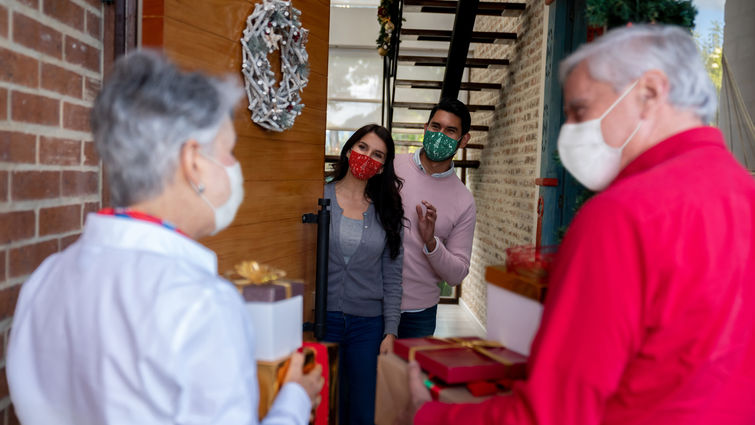
Last updated: Nov. 2024
The holiday season is around the corner, bringing quality time with loved ones, festive feasts, and cherished traditions. However, with increased social activities and gatherings, it's also a prime time for respiratory viruses like COVID-19, RSV, and the flu.
Jennifer Veltman, MD, chief of infectious diseases at Loma Linda University Health, provides a handful of strategies to help ensure a healthier holiday season for the entire family.
Vaccination is key
The Centers for Disease Control and Prevention expects a similar number of hospitalizations this fall and winter as last year due to flu, COVID-19, and RSV. Veltman emphasizes that vaccination is still the best protection against serious outcomes, especially for high-risk individuals, since fully vaccinated individuals are less likely to become seriously ill or transmit the virus.
While some people hesitate to get vaccinated, Veltman hopes people acknowledge the bigger picture. “The Covid, flu, and RSV vaccinations help prevent hospitalization and death,” she says. “While some people might experience slight side effects from vaccines, the minor side effects outweigh potentially deadly outcomes.”
For people concerned about encountering vaccination side effects, it can be helpful to get vaccinated during the weekend to allow for rest and recovery.
Veltman also emphasizes a significant advancement in this year's flu vaccines. During IDWeek –– an annual conference for Infectious Disease professionals –– it was announced that a strain of influenza B has effectively disappeared from circulation due to COVID-related precautions and lockdowns. While this outcome was unexpected, it’s a positive development in eliminating one highly contagious strain of influenza B.
Read: The importance of getting the COVID-19 and flu vaccines this year
Stay home if you are experiencing symptoms
If you're feeling unwell, it's wise to take precautions to protect yourself and others by staying home. Illnesses like COVID-19, the flu, RSV, and even the common cold are highly contagious and spread quickly. If you’re feeling unwell, avoiding social gatherings and close interactions with family, friends, and coworkers can help prevent the spread of illness.
Wear a mask for extra protection
If you plan to attend a large gathering this holiday season, Veltman recommends getting vaccinated at least a month in advance to reduce your risk of illness and wearing a mask in the week or two leading up to the event.
“Each person has to decide their risk tolerance, especially if they plan to spend special time with their family or attend a large gathering,” Veltman says. “Wearing a mask the week prior can help keep you and those around you healthy as you prepare for holiday events.”
For those with immunocompromising conditions, Veltman notes that mask-wearing is still recommended, regardless of the size of the gathering.
Spending time with loved ones during the holidays is important for mental and emotional well-being. This holiday season, it's possible to celebrate with loved ones while prioritizing health and safety. By following these guidelines, you can enjoy the festivities with peace of mind, knowing that you are taking steps to protect yourself and those around you.
Remember, if you feel unwell or have symptoms of Covid, get tested as soon as possible and reach out to your primary doctor about medication options. To learn more about protecting yourself and your family, visit our flu page at lluh.org/flu and our COVID-19 vaccine and treatment page here.
